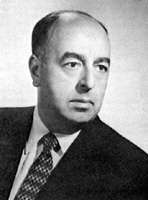David N. Barocas Z"L
1905 - 1978
"Barocas was a constant advocate of preserving Sephardic ethnicity and identity, recognizing the urgent desire of a generation of Sephardim to remain together..."
David N. Barocas was born in Rodosto (Tekirdag), a small town on the northern shore of the Marmora Sea in Turkey. Shortly before 1908, the family moved to Constantinople, where Barocas attended Hebrew school. As his father's business prospered, the family moved to neighboring Galata, where Barocas attended the German-based school Hilfsverein der Deutchen Juden. There, he studied German, Turkish and Hebrew.
Just before the outbreak of the Balkan War, in 1912, his father left for America, and as the economic conditions worsened, Barocas was forced to leave school. When his mother died a few years later, he returned to Rodosto to live with his grandmother, attending informal lessons at the small synagogue, where the former principal of the Alliance school taught French history and grammar. By 1917 Barocas returned again to Constantinople, officially attending the Alliance Israélite Universelle, but left in 1920 for America, before he could receive his diploma.
In 1928, Barocas' father died, and he took his father's place on the Board of Directors at Congregation Berith Shalom of the Spanish and Portuguese Synagogue at Congregation Shearith Israel. Since that time, as Barocas would later write, he became "very close to the community of Sephardim of New York." He remained with Congregation Berith Shalom through its various incarnations, later becoming President when it became the Centro Judio-Sefardi - The Sephardic Jewish Center of the East Side.
Barocas was a constant advocate of preserving Sephardic ethnicity and identity, recognizing the urgent desire of a generation of Sephardim to remain together through organizations and social clubs. His thoughts and ideals were instrumental in the formation of the Broome and Allen Boys Association, later assisting for a time as Editor of The BABA, their monthly publication. Barocas somehow found time to be president of the Sephardic Jewish Brotherhood of America, master of the Masonic Abravanel Lodge 116, and one of the founding members of the Abravanel Square Club, while still continuing to write and lecture regularly. After the tragic and untimely death of his only son, followed shortly afterwards by the death of his wife, Beatrice, in 1951, Barocas redoubled his efforts, writing and researching, and trying to raise funds for Sephardic cultural endeavors. There were few major Sephardic organizations in New York City which did not benefit from his leadership and actions. His activities as a communal leader, orator and self-made scholar were acknowledged by those within the Sephardic community, and a 1958 testimonial dinner in his honor, tendered by the Abravanel Square Club, was further evidence of such appreciation.
At heart, David Barocas was a perfectionist, and throughout his life he often felt that Sephardic culture could be discussed accurately only by individuals who fully understood and experienced it. He was disturbed and outraged by self-proclaimed spokesmen of Sephardic Jewry who had little direct knowledge of authentic Sephardic life. Time and again he wrote of the sad state of apathy by the 'Sephardim of today.' As a representative of 'the authentic Sephardic experience' he identified Sephardic mannerisms and customs. He provided insight, details and observations which only an insider could offer.
And Barocas was continuously striving to learn and to share his knowledge with others. In addition to his involvement with the Sephardic community, he carried on a vast correspondence with newspapers and magazines, with learned individuals and scholars, and with organizations. He did not allow the widespread apathy and lack of financial support to silence his voice.
In his remaining years, as Secretary for the Foundation for the Advancement of Sephardic Studies and Culture, Barocas tried valiantly to eliminate the deep-rooted cultural neglect and apathy of the Sephardim, hoping to reawaken within them a sense of cultural and social responsibility. To that end, he had written and edited a number of tracts, all of which were published by the Foundation.In 1978, in the last few months before his death, Barocas was still at work translating into English, nearly all of the Pirke Avoth portion of the Me'am Lo'ez. Right up until the end, Barocas worked diligently to pave the way for a new era of Sephardic enlightenment. His influence, and his work, will continue to be remembered for generations, especially by those who recognize in his writings his sincerity, devotion and true love for his Sephardic heritage.



